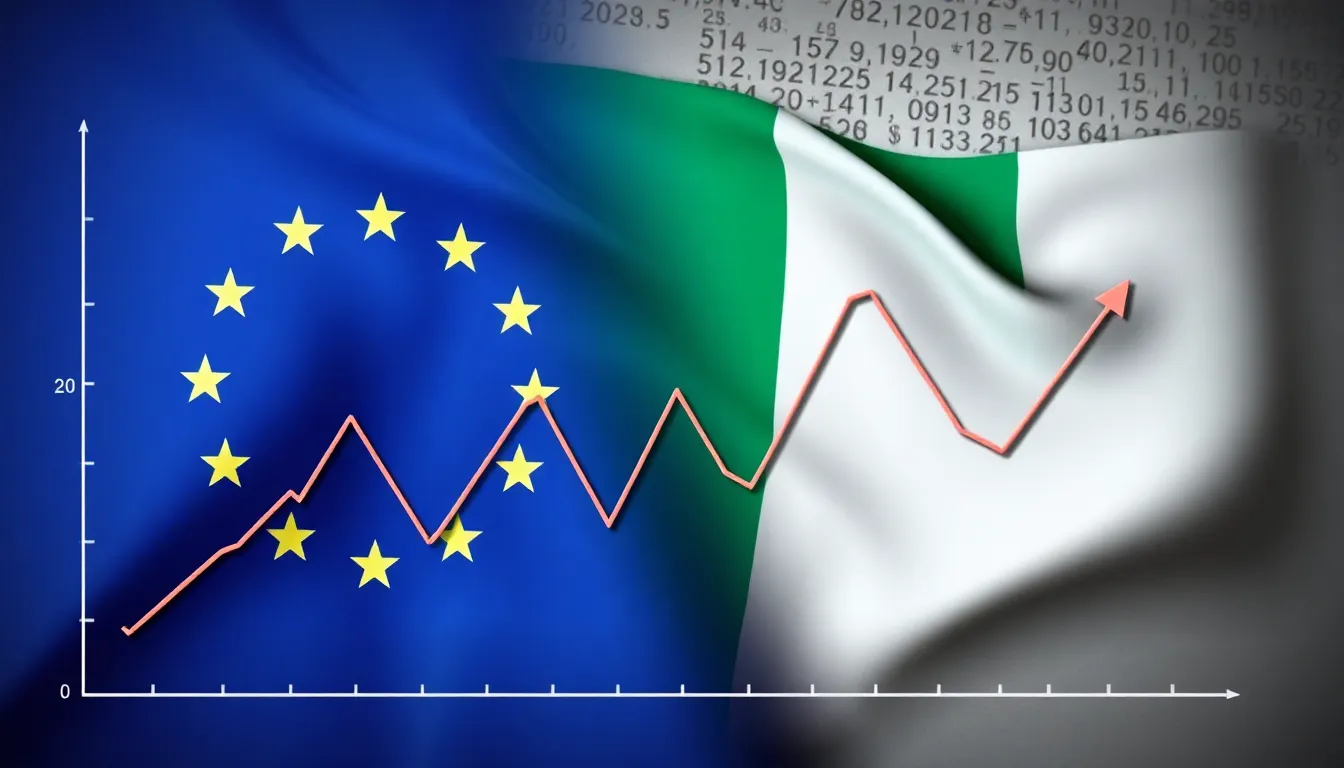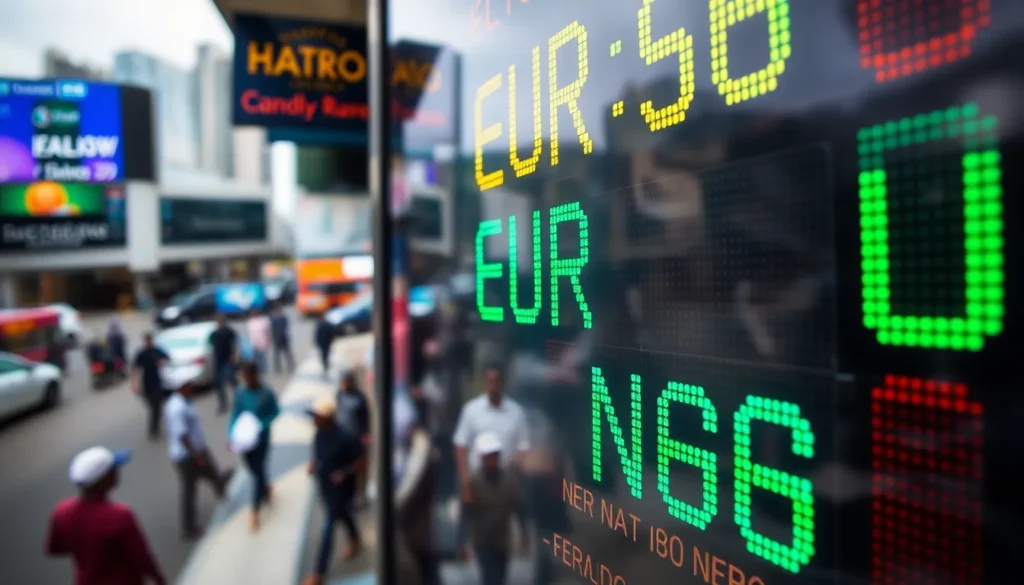Navigating the world of currency exchange can feel like trying to find a needle in a haystack—especially when it comes to the EUR to NGN exchange rate. With fluctuations that can make your head spin, keeping up with today’s rate isn’t just smart; it’s essential for anyone looking to make savvy financial decisions.
Table of Contents
ToggleOverview of EUR to NGN Exchange Rate Today
The current EUR to NGN exchange rate reflects ongoing market conditions. As of today, 1 Euro exchanges for approximately 3,300 Nigerian Naira. Monitoring these rates frequently helps individuals and businesses make timely financial decisions. Changes in economic indicators and geopolitical events impact exchange rates significantly.
Currency fluctuations can directly affect travel costs and international trade expenses. In recent weeks, the EUR to NGN exchange rate has shown volatility, which may influence remittances and import costs. Historical data shows that the exchange rate varies by as much as 50 Naira within a single week, emphasizing the necessity for constant awareness.
Bank forecasts predict that economic stability in the Eurozone could strengthen the Euro, potentially increasing its value against the Naira. Conversely, political instability in Nigeria might lead to depreciation of the Naira, resulting in a higher exchange rate.
For anyone planning to exchange currency, finding competitive rates offers substantial savings. Various platforms and financial institutions provide this service, each with unique fee structures. It’s vital to compare these rates before executing an exchange.
Tracking daily scenarios can reveal trends, enabling better financial planning. Keeping up with expert analyses and economic reports supports informed currency exchange decisions. Using this knowledge allows individuals to mitigate risks associated with currency trading.
Factors Influencing the EUR to NGN Exchange Rate

The exchange rate between the Euro and the Nigerian Naira fluctuates due to several key factors. Understanding these can help individuals make informed currency exchange decisions.
Economic Indicators
Economic indicators significantly impact the EUR to NGN exchange rate. Gross Domestic Product (GDP) growth in the Eurozone strengthens the Euro, while a slowdown in Nigeria’s economy can weaken the Naira. Inflation rates also play a crucial role; higher inflation in Nigeria often leads to a depreciation of the Naira against the Euro. Interest rates set by the European Central Bank and the Central Bank of Nigeria affect currency attractiveness. Strong employment figures in Europe generally correlate with a stronger Euro, while poor job statistics in Nigeria can lead to increased volatility in the Naira’s value.
Political Stability
Political stability in both the Eurozone and Nigeria affects exchange rate dynamics. A stable political environment in Europe fosters confidence among investors, which tends to strengthen the Euro. Conversely, political unrest or instability in Nigeria can lead to a decline in Naira value. Decisions made during elections, government policies, and regulatory changes can create volatility. Frequent changes in government or legislation in Nigeria often result in uncertainty for foreign investors. These factors contribute to fluctuations in the exchange rate and impact individuals planning international transactions.
Current Trends in the EUR to NGN Exchange Rate
The EUR to NGN exchange rate trends reflect both economic and political landscapes. Recent data shows fluctuations that can be as drastic as 50 Naira in just one week. Monitoring these shifts becomes essential for trades and remittances due to potential cost impacts.
Recent Fluctuations
Current rates indicate an approximate value of 3,300 Nigerian Naira for 1 Euro. Several factors contribute to this rate, including ongoing market dynamics and external pressures. Factors such as inflation trends in Nigeria directly affect Naira strength. In contrast, economic growth in the Eurozone tends to support the Euro’s value. Global events can also prompt volatility, prompting immediate analysis and strategic planning for individuals and businesses.
Predictions for Future Movements
Forecasts suggest possible strengthening of the Euro if economic stability in the Eurozone continues. Conversely, any emerging political instability in Nigeria may lead to further depreciation of the Naira. Analysts anticipate that prevailing economic conditions will influence these currencies significantly. Tracking expert insights can help navigate potential risks and identify opportunities for advantageous currency exchange. Staying updated with these trends enables individuals to make informed financial decisions that align with economic realities.
How to Monitor the EUR to NGN Exchange Rate
Monitoring the EUR to NGN exchange rate involves several effective strategies. Using financial websites provides real-time updates on currency values. These sites display the latest rates and trends, allowing users to track fluctuations quickly.
Mobile applications offer another convenient method. Many finance apps send notifications on significant changes to exchange rates. By enabling alerts, individuals receive timely information about any substantial shifts.
Social media platforms can also be a valuable resource. Experts often share insights on current trends and predictions within financial forums. Engaging with these communities enhances understanding of market dynamics.
Consulting banks and financial institutions helps in obtaining credible exchange rate data. Many banks publish their rates online, reflecting market conditions. Checking these rates aids in making informed decisions about conversions.
Utilizing online currency converters streamlines the process of calculating exchange amounts. These tools provide instant conversions based on current rates. Relying on them ensures accurate estimations for transactions.
Government economic reports highlight important indicators affecting currency values. Regularly reviewing these reports can reveal factors such as inflation and interest rates. Understanding these elements clarifies how they impact the EUR to NGN rate.
Finally, following economic news keeps individuals in the loop regarding global events. Political situations and economic stability in the Eurozone or Nigeria can influence the exchange rate. Staying informed equips individuals to respond effectively to market changes.
Staying updated on the EUR to NGN exchange rate is crucial for anyone involved in international transactions. The current rate of approximately 3,300 Naira for 1 Euro exemplifies the ongoing fluctuations driven by economic and political factors. As conditions evolve in both the Eurozone and Nigeria, the exchange rate can shift dramatically, impacting travel costs and trade expenses.
By leveraging various tools and resources, individuals can monitor these changes effectively. Awareness of the market dynamics not only aids in making informed decisions but also helps in identifying potential opportunities for advantageous currency exchanges. Staying informed is key to navigating the complexities of currency fluctuations.




